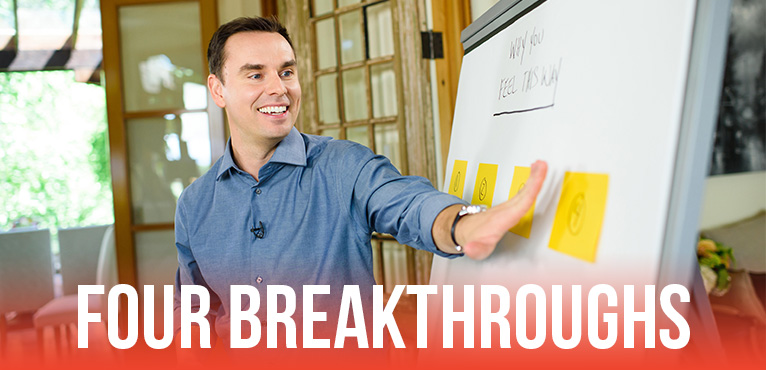SUMMARY
- “You are not responsible for other people’s energy. You are not responsible for their ambition. You are not responsible for changing them. Let life be their guide.”
- How do you motivate other people to strive for MORE? In this episode, learn four practical ways to encourage, inspire, and motivate those in your life to reach their dreams.
- “People need to be cheered on even when they’re failing. People need to be cheered on even when they’re stuck.”
- Watch the video to get the full training.
- If you have someone in your life that you want to motivate or be a role model to, follow these four practices to better your connection, communication, and relationship!
- To start putting these four tips into practice, complete the worksheet for this training here.
- Already have the High Performance Planner and CRUSHING each and every day? Let’s celebrate you! Take a photo with your planner and use #HPXlife or #TeamHPX.
HOT NEWS & DEALS!
- Free Book!
My blog readers get a complimentary copy of my new book High Performance Habits, while supplies last! I bought 1000 for you – so no charge for the book itself – but I do ask you pay your shipping. While supplies last. Get yours here. - 8 Online Courses for $10!
My blog readers also get an exclusive $10 trial to access ALL my personal development courses! Click here for the $10 trial. Students call it “the Netflix of Personal Development.” You’ll call it the curriculum that changed your life forever! - High Performance Planner!
This is the 2-in-1 planner and journal achievers use to win the day and accelerate long-term success. Get yours here (while supplies last!)
DID YOU KNOW?
I give weekly prizes, gratitude and shout-outs to our students, so post a screenshot or video on Instagram and use #TheBrendonShow! I can’t wait to hear your thoughts about this episode!
RELATED POSTS
I Lost My Motivation
How to Reignite Your Life
How to Play the Long Game (and Avoid Burnout)
I’m Discouraged, What Should I Do?
How to Evaluate Opportunities



FULL TRANSCRIPT
[The following is the full transcript of this episode of The Brendon Show. Please note that this episode, like all TBS episodes, features Brendon speaking extemporaneously–he is unscripted and unedited. Filmed in one take, The Brendon Show has become one of the most viewed unscripted, direct-to-camera self-help series in the history of YouTube. It has also been the #1 Podcast in all of iTunes and is regularly in the top podcasts in Self-Help and Health categories around the globe. Subscribe to the free motivational podcast on iTunes or Stitcher.)
How do you motivate other people?
I am asked this all the time. Most of you guys know I wrote the book, The Motivation Manifesto, but that was about how do you motivate you—how do you motivate yourself? But I’m always asked by other people, “Well, I’ve got a team,” or “I’ve got a teenager,” or “I’ve got my dud of a husband or wife who aren’t excited, positive, and optimistic. Brendon, they’re not into personal development. They’ve got no motivation to do their job, they’ve got no motivation to live their best life. How do I change them?”
So of course, let me begin with this. Your job is not to change them. Your job is not to fix everybody else’s problems in life. Your job is not to handle everyone else’s train wrecks in their lives, either.
And I say that with all due respect because often, we get so frustrated with people because we feel like we should be able to change them. But often what I tell people is to be careful of that. When I began my career as a writer and a personal development trainer and coach 16 years ago, I remember I was so motivated and driven, and I wanted to help my family and all my friends. I didn’t want to fix everybody, but just to inspire everybody to be their best.
But you can’t inspire everybody to be their best.
Some people are into personal development, some people are into motivation. Some people are into achievement, and some people aren’t. And what I tell people often—and I’ll give you some strategies that you can use to actually motivate people—I want to give you permission right now to understand that you don’t have to fix everybody, and not everybody has to be as ambitious, as driven, as optimistic, as into personal development and professional growth as you are.
In other words, it’s okay that other people have different ambitions for their lives. I think that’s critical to understand.
I would get so frustrated. I’d think, “Why don’t you want to be a millionaire? Why don’t you want to be happy all the time?” And for some people, that’s just not their mode.
I just want to give you permission to understand you don’t have to change everybody.
I would get so frustrated when I got into personal development. I thought, “Why don’t you want to become great? Why don’t you want to become a millionaire? Why don’t you want to be happy and joyous? Why don’t you want to lead, contribute, and serve?” And some people are like, “That’s not my thing!” And I was like, “How can that not be their thing?”
But listen, just as much as you so desperately desire for other people to let you be you, for other people to let you do your own thing and take your journey the way that you want to take it and the way that you need to, you must also allow that of others. That is so hard to tell people because I know you might be watching this video because you’re a leader and you’ve got a team and you need them to perform based on how you’re compensated, or you’ve got a teenager and you need that teenager to turn on or they’re going to fail out of school.
I know it’s important to put into work, so I’m going to give you four ideas for how to motivate people right here in this video.
But right off the bat, I am letting you off the hook, too.
You are not responsible for other people’s energy. You are not responsible for their ambition. You are not responsible for changing them. Let life be their guide.
Let life show them what’s up. Let them discover their own path just as much as you’ve discovered your path.
But I also know that if you’re in my community—and we just call my community HPX, the High Performance Experience—we all want to experience that next level of life that’s more vibrant, connected, and excellence-driven. And if you’re in this community of HPX, you’re like, “Brendon, no! Let me shape these humans.”
So let me give you some ideas for that.
1. People Support What They Create
The first rule of thumb in motivating other people is to always know this phrase. I often teach this as the five most important words in all of leadership, and that is: People support what they create.
People support what they create.
If you want to motivate someone to do something, they must be actively involved in shaping and creating the vision, or the idea, or the strategy, or the planning for the thing. You can’t just walk into a team and say, “Hey everybody, do this! Be motivated.” They’d be like, “What? Wait, what is this new idea?” If they’re not involved, then they’re often critical. And guess what people do when they’re critical? Nothing. Guess what people look like when they’re critical? Unmotivated. What’s happening is they’re full of doubt or uncertainty or they don’t get it because they didn’t get to participate.
If you want people to be motivated, you must invite them to participate. With no participation, no motivation. When you come to them with an idea, they’re a bit resistant sometimes. They’re like, “Wait, what? What’s this all about?” But if you ask them a bunch of questions and they come up with the idea, have you ever seen them turn on? They’re like, “Oh, I got this idea!” They get so excited about it. When they have the idea, they get motivated for it.
So your job is to ask questions, not to be the person to tell them to be more motivated.
But instead, ask questions about their passions, their desires, their needs, their hopes, their problems. Connect with them empathetically and with curiosity.
Ask them questions. “What’s real for you? What are you trying to do? What would you like to do? Oh, you like to do that? What would be your next steps? What might be something you can do?” Ask more questions. Let them generate more ideas. As they generate more ideas, they feel like they’re participating, and those ideas become theirs. And when someone has an idea that’s theirs, they want to protect it, they want to nurture it, and they want to make it happen because they’ve got skin in the game versus you just saying, “Be motivated to do this thing.”
Ask them to get involved and participate. I know what you’re going to say. “But Brendon, they don’t want to participate.” It’s because you haven’t cued them correctly. You haven’t asked them enough questions that were genuine questions, authentic questions that were questions for them—not for you. There’s a difference between asking for participation, asking for engagement, and seeking to manipulate. And that’s why most people fail in motivating other people. Their intention is to get this person to this specific outcome, and that’s when they consider them to be motivated. But no—they’re trying to manipulate other people to follow their path, their course, and be them. And we’ve all had people in our lives who have done this.
You’ve probably had a parent or caregiver, or know someone who had an overly controlling parent. You don’t want to overly control anybody. What you want to do is create greater freedom and belief with them by having them be in active dialogue about their own goals and dreams. And when they’re in an active dialogue with you—creating, generating ideas, brainstorming— that’s going to create the energy that can later translate into real motivation.
I hope that helps. Remember, people support what they create. Once you get that, everything shifts.
2. Empower Them with Competency
Number two, if they’ve shared something or they have a vision or they have a goal, but they seem really unmotivated, often it’s because they lack competency for getting there. What does that mean? It means they don’t have the map. They don’t know what to do. They have the hope, they have the idea, they have the ambition, but they literally don’t know what to do on Monday.
And when you lack competency, you often lack motivation.
In fact, we know from my studies in high performance and in psychology that when you lack competency, you lack confidence. Well, if I don’t feel confident towards something, obviously I’m less likely to be motivated to go for it, right? So you have to understand this important nature of competency and confidence. We call it the Competence-Confidence Loop.
The more someone has competency— and in this word I’m using today, competency means a collection of knowledge, skills, abilities, and talents that allows you to have the know-how to do something. Well, if you don’t have the know-how to do something, you won’t try. And if you don’t try, you don’t get the hit of confidence. But if you have the competency—the knowledge, skill, ability, and empowerment to do something— guess what happens?
“Oh! I take the step. Oh! I’ve got some reward, I’ve got some progress. I’ve got some momentum here. I feel more confident. I’m more motivated to try again.” So your job, if you really want to lead people or motivate people, is to ask them whether or not they have what they need to be able to do it.
“Do you know what you need to do? Should we brainstorm a plan? Do you need to get a skill? Do you need to get a mentor? Do you need to read some books on that? Do you need to take some courses on that?” Because if they lack the know-how, how would you expect them to know what to do? So, it’s important to empower people with competency.
I’m always thinking about that. If I know what somebody wants, I ask, “What do you need for that? A new tool, new training, new video, new insight?” Your job is not to just motivate them with rah-rah words, but real empowerment. Give them the tools, the education, and the resources or access to those things.
And once they have that, if you are a leader in an organization, then think about this: You also have to empower them with what is essentially decision-making authority and trust. Meaning, if they kind of know how, you need to step back. Step back and let them mess it up and try.
One reason people get demotivated is because as they’re starting and they’re in that hot mess mode of not knowing how it’s going, the person trying to motivate them is judging them. Guess what judgment does? It shuts people down. So you’ve got to let people experiment, try, be a hot mess, not get ahead, and as they’re trying, you’re celebrating the effort, not just awaiting the outcome.
People need to be cheered on even when they’re failing. People need to be cheered on even when they’re stuck.
And if you aren’t actively providing them the tools, resources, education, decision-making authority, trust, or cheering on, no wonder they’re not motivated. They feel disempowered. And when someone is disempowered, they’re never going to have the goals, dreams, and the drive that you want them to have or that they’re even capable of. It’s so important.
And if you can’t give it to them, cue it to them. Ask them, “What books could you read? What courses could you take?” Send them videos and send them podcasts. If you’re in my world, if you’re in our HPX community, you know I am always giving resources on my podcast, YouTube, Facebook, and Instagram Lives. Take what is useful for you, leave what’s not, but I’m putting out everything I’ve got to help you with this.
If people say, “Brendon, you’re motivating,” it’s because I’m always giving them resources and tools. I’m hopefully motivating them by empowering them. That’s my goal versus just being the rah-rah guy who swears or cusses to get a little edge on you. Instead I’m like, “Let’s give you the real tools.” And by doing that, I think it’s made my career and this community in HPX very different.
3. Provide Clear Goals and Rewards
Third big idea for them: you’ve got to make sure that they’ve got some kind of clear goals and rewards. And this is the hardest thing for people.
If someone is lacking motivation, you can’t just go up to them and say, “You should have goals!” They’re going to be like, “Shut up. I’m watching Netflix right now.” You’ve got to learn to pull that from them and learn to empower that. If they don’t have goals, you could be like, “Well, if you had what you wanted in life and you were who you wanted to be, what would that look like?” And then you’ve got to help step them backwards through it. “Okay, I’d love to live in this town with this kind of house with this type of person and this type of thing.”
Then, tell them to work backwards. Ask, “What would you have to do to earn that? What would you have to do to become that? What are some goals you could set? If you could start marching towards that, what’s something you could do in the next 30 days to begin?” And this is important.
Don’t think you’re going to motivate people with super long-term goals. You know who are driven by really long-term goals or higher level goals—often what we’ll call mission or purpose? People who are already achievement-driven. But people who are stuck and people who are unmotivated just need to take that first step or that first two. Start with a monthly goal. Stop thinking, “Let’s change your life! What’s your five-year vision?” They’re like, “Five years? I don’t know what I’m eating tonight.”
They’re overwhelmed. Overwhelm often leads to demotivated people. And often they’re demotivated because they’re trying to take on too much and they’re not getting and celebrating or being compensated for the small steps, for the initial steps, and that’s what’s important for you to realize. You want to motivate people? Help them recognize, realize, and discover those small steps and set some rewards.
“Oh, you’re going to do that this month? Let’s pretend it’s the 30th of the month and you actually did it. How would you celebrate?”
“I’d take my girlfriend out for a big dinner.”
“Cool.”
“Oh, I’d take a day off.”
“Okay, cool.”
“I’d go to that favorite place I like to go.”
“Cool!”
Cheer that on. And then when you see them, listen. When you see them, you’re not trying to just tell them to go do something. Instead, you say, “So, are you going to get to go on that date with your girlfriend? Are you going to get to go to that favorite place? When you egg them on, you’re actually encouraging them to achieve that thing they told you they wanted, not just asking them to work harder. Instead, have them see that short-term celebration, that short-term win.
In your dialogue with them, start talking about the win more than you’re talking about the work because you’re often telling them to work and be motivated. Instead, they want to talk about getting the thing, and that will motivate them. And that’s not true for everybody, but for a demotivated person, they’re more likely to be excited to talk about what they want than talking about the grind. I hope that makes sense.
4. Be the Role Model
And then the last big idea. Remember, you’re the role model.
They need to see Mom, Dad, you leading and living with real motivation and drive. How do you do that? It’s not about just seeing you work hard. What they need, if you want them to become more motivated, is to be in dialogue about motivational things.
So your job is to share more often and more consistently with this person you’re trying to motivate—your whys and your distinctions along the way.
What I mean by that is you’ve got to share in a continual conversation. “Hey, I’m working towards this. And I just learned that if I did it this way, it would get this outcome. Now I’m more excited to do it.”
You’ve got to share that a lot—very consistently. You must share your journey and your lessons on that journey more with them if you want them to be motivated. But often you’re embarrassed to do that because you don’t want to feel like you’re bragging. Or, you’re worried about sharing those things because you think it will disempower them. They see you having so much and succeeding and moving ahead, and you don’t want to bring it up to them because you think, “Oh, well, they’ll feel awkward, or weird, or insufficient around me.”
First, let go of your ego about that. That’s nonsense. It’s a beautiful thing that you get to share your journey with another person. If they ever say, “I don’t want you to share your journey, your feelings, and your lessons learned in life with me ever again,” then be like, “Okay, cool.” But until they say that, share it. I want you to hear this because I know a lot of you have this assumption in your mind that you can’t share your successes with other people because of the way you were raised. You thought, “Well, that’s bragging.”
No! That is empowering the next generation!
Why is it we have so many generations of young people struggling to be motivated right now? Because the people who already succeeded don’t share, they don’t mentor, they don’t role model, they don’t coach, they don’t help. So they’re left alone trying to figure things out on their own. We have entire generations that never passed on their great standards, their great learnings, their great drives, their great purposes.
So we have a whole new generation reinventing the wheel. Reinventing the wheel is demotivating because we all want to start at speed. And the way to start at speed is having people around us share it. I am only here doing this for you because I would go to a conference and other people would stand on stage and go, “I started just like you, but here’s what I learned, and here’s what I did.” And I’d get motivated seeing they did it too.
You need to be that role model for other people, and I really think that’s important—that you are always sharing your journey. Stop hiding your journey. Stop hiding your love for personal development. Stop hiding your motivation. Stop hiding all those distinctions that you can pass on to somebody. I want you to share it until they tell you to stop and that’s my rule in life.
And I’ll tell you what’s funny. I would say 50 people in my life— I’ve thought they didn’t want to hear about my journey, my successes, my struggles, what keeps me going, and what I’m learning. I used to say that to a lot of friends. “They don’t want to hear this!”
And then you know what? Years go by and they go, “Brendon, I don’t feel like I know you anymore. You never share what’s going on.” And I thought, “Oh, maybe if I share what is going on they’d have a different spark in their life.” Your sharing can be their spark, my friend.
All right, I hope you enjoyed this one.
If you did, would you do me a favor? Share it. Share it with some friends who are having a tough time. Share it with your team, share it with those that you lead and love and serve because I think a lot of people need to be let off the hook. It’s not your responsibility to change everybody.
But I also think that these four ideas might generate some ideas and maybe some new beliefs and new commitments to serve the people around them as well. So please, share this #hpxlife.
Again, HPX stands for the High Performance Experience. I’d love for you to help build this community of people worldwide who really want to go to the next level, who want not just success there, but all of the well-being, depth, and vibrancy. And yes, the motivation that comes along the way.
My friend, today you can go out and choose to inspire other people or ignore them. I say go inspire them, but do it with empathy, do it with participation, and do it with a belief that you sharing your journey can be just as motivating to those around you. You are a force in this world, my friend. So share your journey, stay motivated, and lead those around you. And again, thank you for being part of HPX.


